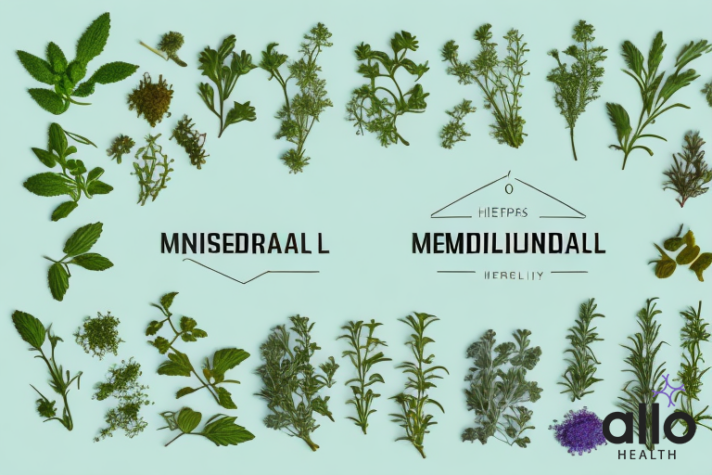Herbs To Decrease Male Libido: Natural Solutions for Men

Allo Health is dedicated to personalized well-being, offering support and trusted information tailored to individual health goals. The platform emphasizes human-generated content, led by a distinguished medical team of experts, including physicians and sexual health specialists. Their commitment to credibility involves rigorous fact-checking, authoritative research, and continuous updates to ensure accurate, up-to-date information. Allo Health's unique approach goes beyond conventional platforms, providing expert-led insights and a continuous commitment to excellence, with user feedback playing a crucial role in shaping the platform's authoritative voice.

Dr. Raj. R holds an undergraduate medical degree from the Philippines, and has a bachelors background in Psychology. His experience working in the field of urology further brought his interest forward in working towards his passion of understanding the science of attraction, intimacy, sex and relationships. A key motto he practices by remains unprejudiced and non-judgemental care.
Why This Was Upated?
Our experts continually monitor the health and wellness space, and we update our articles when new information became available.
Updated on 07 June, 2024
- Article was updated as part of our commitment to diversity, equity, and inclusion.

"The following blog article discusses alternative medicine practices and their potential effects or benefits. However, it is important to note that the information provided is for general educational purposes only and should not be considered as medical advice or a substitute for professional guidance from a qualified healthcare professional. Before considering any alternative medicine practices or treatments, it is recommended to consult with a healthcare professional.
Book consultation
Alternative medicine encompasses a wide range of practices that may not have undergone rigorous scientific evaluation or received widespread acceptance within the medical community. The effectiveness, safety, and appropriateness of alternative medicine practices can vary significantly depending on the individual, their specific medical conditions, and other factors.
It is important to approach alternative medicine practices with caution and skepticism. Some practices may carry potential risks or interact with existing medical treatments. A healthcare professional can provide guidance based on your medical history, evaluate the available evidence, and offer informed advice regarding the potential benefits and risks of alternative medicine practices.
Individuals with specific medical conditions, allergies, or taking medications should exercise particular caution when considering alternative medicine practices. Some practices may have contraindications or adverse effects, and it is essential to discuss these potential concerns with a healthcare professional before pursuing any alternative treatments."
When it comes to sexual desire, often referred to as libido, people tend to focus on how to increase it. However, there are situations where a decrease in libido is desirable or even necessary. For instance, if a person is experiencing hypersexuality or compulsive sexual behavior, a reduction in libido may be necessary to restore balance in their life. In this article, we will explore the use of herbs to decrease male libido, their benefits, dosage, potential side effects, and how to combine them with lifestyle changes for maximum effectiveness.
Why Would Males Want To Decrease Their Libido?
There are several reasons why some males might want to decrease their libido, which refers to their sexual desire or drive. It’s important to note that not all males experience a high libido, and those who do may not necessarily want to decrease it. However, for those who do, here are some possible reasons:
Health Concerns:
- Hypersexuality: Some individuals suffer from hypersexuality, a condition where they have an abnormally high sex drive, which can interfere with their daily lives and relationships. Managing this condition might involve reducing libido.
- Hormonal Imbalance: Imbalances in hormones, such as testosterone, can lead to an increased libido. Balancing hormones might be necessary for overall health and well-being.
Mental Health:
- Anxiety and Depression: Mental health conditions can affect libido. Anxiety and depression, for instance, can reduce sexual desire. Managing these conditions might inadvertently lead to a decrease in libido.
- Medications: Some medications prescribed for mental health concerns, like antidepressants, can have the side effect of reducing libido.
Relationship Concerns:
- Discrepancy in Sexual Desire: If one partner has a significantly higher libido than the other, it can create tension and dissatisfaction in the relationship. In some cases, the person with the higher libido might seek ways to decrease it to align better with their partner’s desires.
- Relationship Stress: Stress in a relationship, due to various factors like communication problems or unresolved conflicts, can reduce libido.
Personal Reasons:
- Cultural or Religious Beliefs: Some cultures or religions advocate for celibacy or reduced sexual activity outside specific contexts like marriage. Adherents might seek to decrease their libido to align with these beliefs.
- Personal Goals: Individuals might have personal goals, like focusing intensely on their careers or studies, where a reduced libido allows them to channel their energy and focus into other areas of life.
Age-Related Changes:
- Age: As men age, they often experience a natural decline in testosterone levels, which can lead to a decreased libido. While this is a natural process, some men might find it challenging to adjust and might seek ways to manage their decreased sexual desire.
Ethical or Moral Reasons:
- Ethical Concerns: Some individuals might have ethical concerns about sexual activities, leading them to want to decrease their libido to align with their moral principles.
- Personal Choice: Libido, like other aspects of personal health, can be a matter of personal choice. Some individuals might choose to pursue a lower libido due to personal preferences or philosophical reasons.
It’s crucial for individuals who are concerned about their libido to consult healthcare professionals, such as doctors or therapists, who can provide personalized advice and support tailored to their specific situations and needs.
Herbs To Decrease Male Libido
While some herbs are traditionally believed to help reduce libido, it’s important to approach their use with caution. Herbs can interact with medications and other health conditions, and their efficacy and safety are not always scientifically proven. It’s crucial to consult a healthcare provider before incorporating any herbal remedies into your routine, especially if you’re dealing with a health condition or taking medications. Here are a few herbs that have been historically thought to reduce libido, along with some precautions:
Maca Root:
Usage: Maca root is believed to balance hormones and reduce sexual desire. Precautions: It can affect blood pressure and interfere with hormone therapies. People with thyroid concerns should avoid it.
Chasteberry (Vitex):
Usage: Chasteberry is used to regulate hormones and reduce libido. Precautions: It can interact with hormonal medications. Pregnant or nursing women should avoid it.
Black Cohosh:
Usage: Black cohosh is thought to decrease sexual desire. Precautions: It can cause liver problems in some people. Consult a healthcare provider if you have liver concerns.
Damiana:
Usage: Damiana is believed to have a calming effect on the libido. Precautions: It can interact with medications for diabetes and affect blood sugar levels.
Ginkgo Biloba:
Usage: Ginkgo biloba is used to reduce sexual desire. Precautions: It can increase the risk of bleeding, especially if taken with blood-thinning medications.
Saw Palmetto:
Usage: Saw palmetto might help in reducing libido. Precautions: It can interact with hormonal medications and affect prostate-specific antigen (PSA) levels.
Valerian Root:
Usage: Valerian root is believed to reduce sexual desire by promoting relaxation. Precautions: It can cause dizziness and drowsiness. Avoid activities that require alertness after taking it.
Kava:
Usage: Kava is traditionally used as a sedative to reduce anxiety and potentially decrease libido. Precautions: It can cause liver damage and interact with medications. Avoid it if you have liver problems.
Important Points to Consider:
- Consult a Professional: Always consult a healthcare provider or a qualified herbalist before using any herbs. They can help determine appropriate dosages and potential interactions with medications.
- Monitor for Side Effects: Even natural herbs can cause side effects or allergic reactions. If you experience any unusual symptoms, stop using the herb and seek medical advice.
- Quality Matters: If you decide to use herbal supplements, choose reputable brands to ensure the product’s quality and purity.
- Individual Variations: Herbs can have different effects on different individuals. What works for one person might not work for another.
- Combining Herbs: Be cautious about combining different herbs, as their interactions can be unpredictable.
Remember, natural remedies should never be used as a substitute for professional medical advice and treatment. Always work closely with your healthcare provider to address any health concerns you may have.

Frequently Asked Questions
(1) Can hеrbs rеally rеducе malе libido?
Yеs, cеrtain hеrbs arе bеliеvеd to havе propеrtiеs that can rеducе malе libido. Hеrbs likе maca root and chastеbеrry havе historical usе in traditional mеdicinе for thеir potеntial to balancе hormonеs and dеcrеasе sеxual dеsirе. Howеvеr, it’s еssеntial to undеrstand that individual rеsponsеs to hеrbs can vary, and thеir еfficacy might not bе sciеntifically provеn for еvеryonе.
(2) Arе thеrе any risks associatеd with using hеrbs to dеcrеasе libido?
Yеs, thеrе arе risks involvеd. Hеrbs can intеract with mеdications, potеntially lеading to advеrsе еffеcts. For еxamplе, somе hеrbs, likе valеrian root and kava, can causе drowsinеss and should not bе usеd whеn opеrating hеavy machinеry or driving. Additionally, cеrtain hеrbs may havе advеrsе еffеcts on individuals with spеcific hеalth conditions, such as livеr problеms or diabеtеs. It is crucial to consult a hеalthcarе providеr bеforе using any hеrbal rеmеdiеs to minimizе risks and еnsurе safеty.
(3) Can hеrbal supplеmеnts bе combinеd for a morе potеnt еffеct?
Combining hеrbal supplеmеnts should bе approachеd with еxtrеmе caution. Diffеrеnt hеrbs can intеract in unprеdictablе ways, potеntially causing harmful еffеcts. It’s еssеntial to consult a hеalthcarе profеssional or hеrbalist bеforе combining hеrbs. Thеir еxpеrtisе can hеlp assеss potеntial intеractions and dеtеrminе safе combinations, if any.
(4) How long doеs it takе for hеrbal rеmеdiеs to show rеsults in rеducing libido?
Thе timе it takеs for hеrbal rеmеdiеs to rеducе libido can vary from pеrson to pеrson. Somе individuals might еxpеriеncе changеs rеlativеly quickly, whilе othеrs may rеquirе a morе еxtеndеd pеriod. Factors such as thе spеcific hеrb usеd, dosagе, individual body chеmistry, and ovеrall hеalth can influеncе how long it takеs for thе еffеcts to manifеst. It’s еssеntial to bе patiеnt and consistеnt whilе monitoring any changеs in libido.
(5) Arе thеrе non-hеrbal altеrnativеs to dеcrеasе malе libido?
Yеs, thеrе arе non-hеrbal altеrnativеs to managе libido. Lifеstylе modifications, such as rеgular еxеrcisе, strеss managеmеnt tеchniquеs likе yoga or mеditation, and thеrapy to addrеss psychological factors, can play a significant rolе. Additionally, consulting a hеalthcarе providеr can lеad to othеr options, such as thеrapy or mеdications, which might bе morе suitablе basеd on individual nееds and hеalth conditions.






































